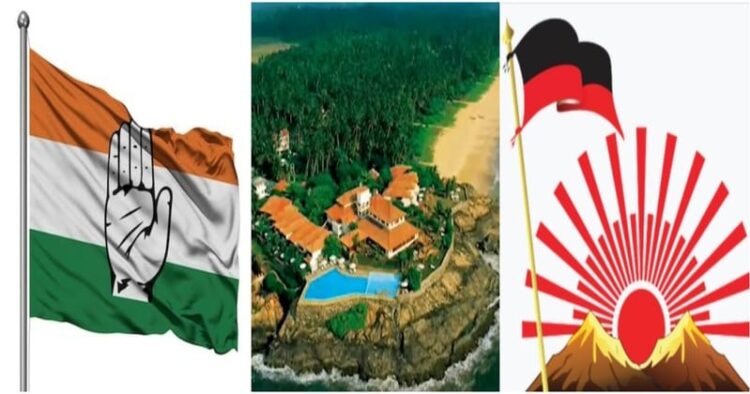The Katchatheevu Island conundrum has stirred up Tamil Nadu politics after the RTI reply received by Tamil Nadu BJP President K Annamalai to his queries on the 1974 agreement between India and Lanka.
Meanwhile, PM Modi once again outclass the opposition in creating a substantial impact. The ruling party in Tamil Nadu Dravida Munnetra Kazhagam (DMK) and the then ruling party Congress is bearing the brunt of the relentless BJP led-centre. PM Modi has punched the soft-underbelly of the opposition as usual.
DMK quarters have hit back at this move as an electoral gimmick by the BJP-led Government at the centre. EAM Dr S Jaishankar responded that the decade-old territorial and fishing rights dispute revolving around the island is not sudden or abrupt; it has often been debated in the Parliament. He mentioned that the issue is frequently raised between the Union and the State Government, and he has answered over 20 times on the issue.
He accused the opposition, especially the DMK and Congress, of giving the issue a cold shoulder. He also mentioned that the Modi Government has to negotiate with the Srilankan Government to free several detained fishermen.
The recent row has dragged Congress’ debacle not only in the Katchatheevu Island issue but also shed light on several caveats of Congress vis a vis its decision-making capabilities in the past. While Katchatheevu Island remains at the core of the discussion, another undercurrent and forgotten issue of Bengal’s Berubari case also sets precedence for the ongoing discussions.
Before the 1970s, when Indira Gandhi’s rule was in place, Katchatheevu Island was formally recognised as Srilankan territory; a similar case study on Berubari during Nehru’s era had almost culminated. During the 1950s, Jawaharlal Nehru wanted to transfer Berubari to Bangladesh (erstwhile East Pakistan). The then Chief Minister of Bengal, B C Roy, opposed the move. Nehru-Noon Agreement proffered to divide Berubari into two equal halves between India and Pakistan through promulgating the Constitution (Ninth Amendment) Act, 1960.
B C Roy fiercely objected to the unilateral decision taken by Nehru. In his 1959 speech, he questioned whether the PM had the right to adjust the boundaries without consulting the respective State Government and whether the PM’s jurisdiction included altering the country’s boundaries. He also took the matter to the Supreme Court. His argument was aligned with Article 1(3)(c), which contextualises the Indian authority to acquire territories but does not mention any provision for ceding the existing ones. The follow-up decision ruled by the 8-judge bench was that a constitutional amendment would be required to transfer India’s territory to any other nation. Thus, this thwarted the autocratic decision taken by the Union Government.
Quickly zooming in on the present heated deliberations over the Katchatheevu Islands, PM Modi has come down heavily on DMK for neglecting the interests of Tamil Nadu’s fishermen community and done zilch to save the island when it was handed over to Srilanka by the then Prime Minister Indira Gandhi. In return for the Katchatheevu, Sri Lanka relinquished its claim over Wadge Bank.
The theory suggests that the then CM of Tamil Nadu, Karunanidhi, threw Tamilians under the bus to save himself from corruption charges and, through the backdoor, shook hands with Indira Gandhi and gave away the strategically vital Katchatheevu islands to Srilanka. For years, the 285-acre island in Palk Bay served as a hub for the fishermen of Tamil Nadu and was condescended to as a ‘small rock’ and ‘little island’ in the eyes of the past Indian leaders. Srilanka grabbed this opportunity, and India lost one of its strategic assets.
The game plan was devised pretty well to counter the vehement accusation from erstwhile Tamil Nadu CM Karunanidhi over the issue by threatening to evict his Government by imposing the President’s rule and unleashing investigation and inquiry over his corruption charges. Thus, he caved in and cooperated. Thus, his hollow promises to pretend to provide paramountcy to the voices of Tamilians and essay a fake altruist commenced. The Katchatheevu island issue, instead of being taken up by the apex court, was decided through a resolution passed by the Tamil Nadu assembly declaring that the island should not be handed over to Srilanka. Therefore, a prophetic plan was in place to dupe the people of Tamil Nadu. The question arises that DMK, which Karunanidhi led, was aware that the resolution passed in the state assembly on a centre list subject is not binding.
Proceeding further, the Jayalalithaa-led AIADMK Government moved to the Supreme Court in 2008 to declare the 1974 and 1976 India and Srilanka agreements invalid. Jayalalithaa scored brownie points for this move, which prompted Karunanidhi to file separate petitions in the apex court in 2013 to revoke the Katchatheevu pacts. The matter remains subjudice. Meanwhile, the BJP Government stated that over 6000 Indian fishermen have been arrested in the past 20 years. Congress and DMK are the root cause of this challenge.
Moral of the story: Congress’ leadership has performed abysmally. Their lack of political adroitness or geopolitical vision has backfired. They believe India is a piece of land that is a chip of bargain. On the other hand, DMK’s moves have not safeguarded Tamilians’ pride. They have downtrodden the real issues under their redundant North-South divide. Their agendas are deep-rooted in divisive politics.


















Comments